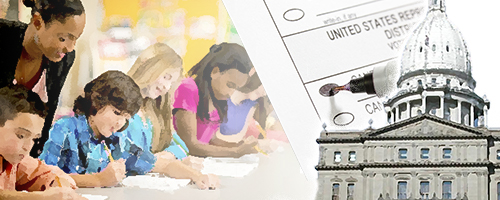Many parent advocates, like me, got into school funding advocacy thinking that what we needed to do was make reasonable arguments to reasonable people. Support for local public schools didn’t have to be a partisan issue, and people of good will could come together to support quality, community-governed, public education. And I still think that could be true.
But, right now, it’s not. Over the last ten years, the debate over public education in Michigan has gone from frustrating to absurd. Uncompromising, unyielding adherence to ideology and narrow beliefs has opened up a chasm in the public debate over our community schools. As the current presidential campaign season shows, it’s not even about strictly partisan politics: the divides inside each party seem just as big as those which separate them. Nor is it a reasoned debate over the mechanics of policy. But it is a political debate – one that touches on our core values and which will shape our schools for years to come.
And, as with any important political debate, the outcome will hinge on who is in a position to decide – who holds political office. Who do we have acting in our name? Do they reflect what we believe? So, that is where we need to begin.
The last ten years of education politics in Michigan have been outlined elsewhere, so I won’t repeat them here. But seen from a distance, you can definitely trace the shift from arguments over budget details to battles over the very nature of public education. For instance:
- In 2006, the biggest battle was over a ballot proposal that would have addressed per-pupil funding lagging inflation and the rising cost of retirement guarantees (it failed).
- In 2008, the struggle was over how to use federal stimulus funds to keep our K-12 schools open.
- But by 2011, the Legislature could permanently eliminate close to $1 billion in K-12 funding in order to pay for major business tax cuts apparently without feeling any negative political consequences.
- In 2012, political leaders proposed a wholesale restructuring of public education, making local school districts a thing of the past and dramatically expanding the options for privatized, but publicly funded, education (these mostly did not pass).
- In 2013-14, legislators upped the ante, increasing the focus on test scores as the only effective measure of the quality of public schools in areas as diverse as elementary school reading and teacher evaluation.
- Now, in 2016, we have pending legislation that would: force schools to emphasize only select parts of the US Constitution; make state standards optional in an open attempt to make room for faith-based education in the sciences and elsewhere; divert millions of dollars of K-12 funding to pay private and religious schools to do things like performing background checks and maintaining vaccine records; and eliminate the only elected statewide body solely focused on public education – the State Board of Education.
That’s not to mention the frightening array of legislation that undermines the people’s control of their own schools, with hard-hit communities like Detroit serving as a pretext.
We’ve come a long way, baby.
The politicians who have orchestrated this campaign against public control of public schools like to say that “elections have consequences.” Indeed they do. That must be part of the reason they are working hard to ensure no election will undo what they have managed to do over the last few years.
But we don’t have to stand around and wring our hands. Nor do we have to fall into the easy pattern of seeing everything as Elephants versus Donkeys. Not so long ago, people of all political stripes agreed that our community-governed public schools were the backbone of our democratic, free society. The idea that we would hand them over to the highest bidder was simply unthinkable.
It’s time to rebuild that broad agreement – that, whatever our disagreements may be, we have certain common values which embrace education by and for the people. All the people.
And the place to start is with those who are acting in our name in Lansing. We need to choose who those people will be, not shrug our shoulders while others choose them for us. We must work to ensure that they remain beholden to us, the people, rather than special moneyed interests which want to control the political agenda.
In short, we need to step up and be citizens in the full sense. We need to wade into the political process, not just criticize it from afar. We need to use our influence to build the kind of government our children and communities deserve. Please join us.

